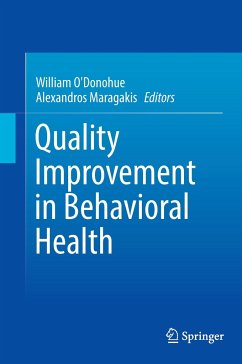
Integrated Behavioral Health in Primary Care
Evaluating the Evidence, Identifying the Essentials
Herausgegeben: Talen, Mary R.; Burke Valeras, Aimee

PAYBACK Punkte
61 °P sammeln!
Contributed by experts who've developed integrative healthcare initiatives with strengths in the areas of policy and principles, organizational systems, or clinical practice. These contributors will illustrate the concepts and describe the nuts and bolts of their integration initiatives. In the conclusion of each section, the editors will construct a template to systematically evaluate these essential elements. This template will organize the information to help stakeholders compare and contrast the strengths, resources, limitations, and challenges of how each model meets the vision of integrative healthcare. In the concluding section the information in the preceding sections connects to provide a coherent synopsis of the common themes and practices, from the macro to micro levels of care, which foster successful integration of the medical and psychosocial systems.














